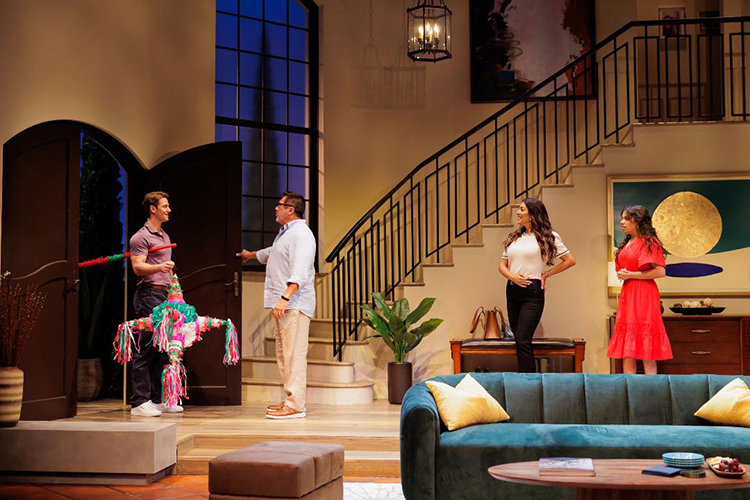
By Sandi Masori

SAN DIEGO— There are some stories that are universal and cross all cultures and generations, such as a girl bringing her boyfriend home to meet her parents for the first time.
This is the main theme of EMMY award winner Gloria Calderon Kellett’s play One of The Good Ones, now running at The Old Globe.
Kellett who is the writer of Netflix’s reboot of One Day At A Time wrote the play with delightful sitcom-like fast-paced dialogue and high LPM (laughs per minute), but under all that are other stories. One is a story of the children and grandchildren of the immigrant generation and the pressure put on them. Another is a story of the struggles between Gen X and Gen Z. It includes Gen Z’s dismissal of formality between generations, and its proclivity to speak in therapy-talk about “boundaries”, “emotional journeys”, and “sitting in big feelings.” A third theme is assimilation vs. identity and heritage retention.
All three stories will feel very familiar, though in this version they are focused on the lives of the Gomez family- a well-to-do Latine family. Puerto Rican/ Mexican mother Ilana (Angelique Cabral) whose family has lived in California since before it was part of the US, doesn’t speak Spanish or cook, much to her own embarrassment. She feels the need to prove her Latina-ness, especially since she “looks white” (and her performance is delivered with a very Drew Barrymore-like vibe.)
Dad Enrique (Benito Martinez) seems pretty chill, until he learns that daughter Yoli’s (Cree) new boyfriend Marcos (Nico Greetham) is a white guy who calls himself Mexican. Marcos identifies as Mexican because though he was born to white American parents, he was born and raised in Mexico and holds Mexican citizenship.
Enrique has a hard time with him calling himself Mexican instead of just white, yet Marcos speaks perfect Spanish and himself feels no different from the Mexican kids he grew up with.
Rounding out the cast, and no less deserving of recognition is Santino Jimenez as Pedro, the flower delivery guy who provides some extra comedic moments.
All the actors are equity actors, and it shows in their embodiment of their characters.
Director Kimberly Senior nailed the comedic timing to keep the laughs flowing. While the actors all really embodied their roles, at times it felt like the chemistry between them was a bit off. I fully believed that each actor was their character, but I didn’t always believe that the couples were really in love with each other, for example.
The fast-paced dialogue and bulls-eye hitting punchlines make this less of an issue than it might have been otherwise.
There are some serious moments though, like Yoli’s monologue on the pressures of being the child of the successful immigrants, the pressure to be perfect and not waste the sacrifices of preceding generations who struggled to build an easy life for the current generation.
These serious moments give pause for thought and will resonate with most people. I also really liked a bit where Ilana and Enrique are lamenting the idea of losing their identities to the American melting pot, and Ilana makes a comparison that we have often used in our family- that instead of a melting pot we should look at it more as a salad- each piece retaining its unique flavor and adding to the experience of the whole rather than being boiled down into single flavor mush. The concept of assimilation and identity loss is one that we Jews know all too well as our children intermarry and forget the struggles and trauma of our past.
Scenic Designer Takeshi Kata’s set is a beautifully appointed living room in a nice Pasadena home. The level of detail and care that went into designing the set blew me away. You really feel like you’ve walked into an upper class home. No detail was left out, yet it is not overdone or cluttered. Instead. it feels open and airy, and real- adding to the tv sit-com feel.
All-in-all it’s a feel-good show that will leave you with things to think about and digest but delivered in a way that is fun and palatable. The play runs through June 22nd.
*
Associate Editor Sandi Masori is a theater and food reviewer for San Diego Jewish World